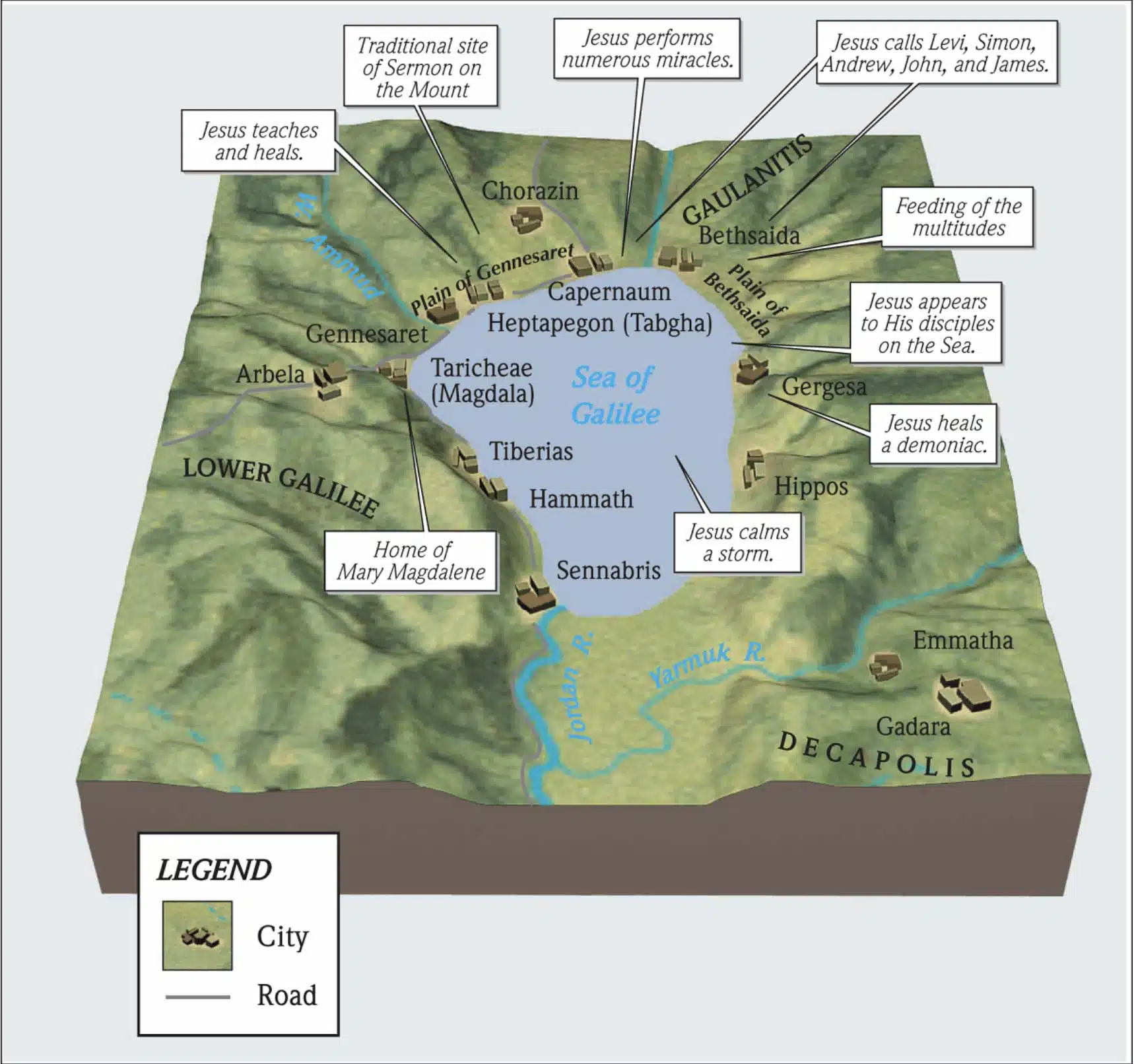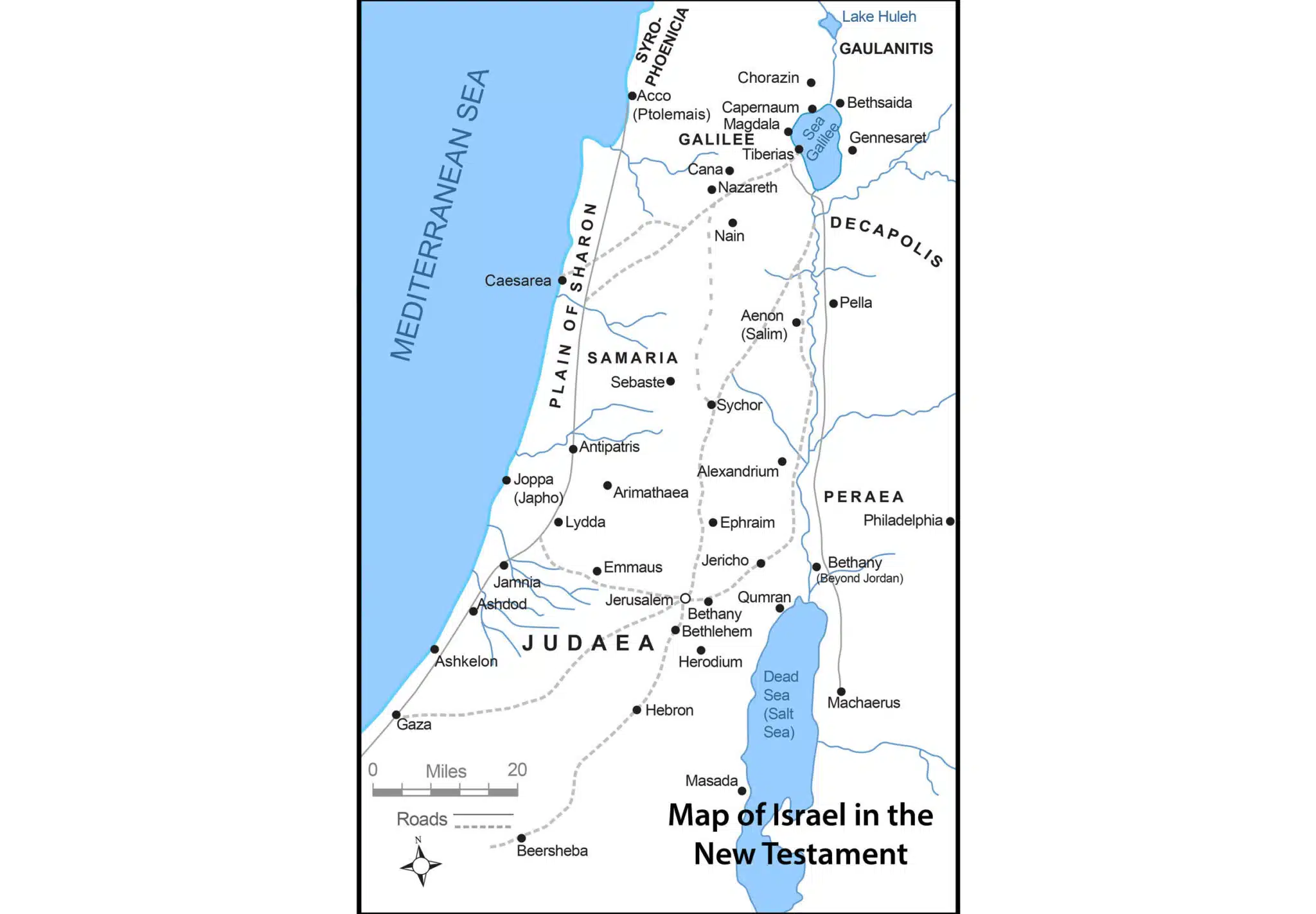Tax collectors from the Temple ask Peter whether or not Jesus pays the temple tax prescribed by the Mosaic Law. Peter replies “Yes.” When Peter enters his house, Jesus asks him if the king’s sons pay taxes to their Father. Peter replies “No.” Jesus then tells His disciple that neither does He owe anything to these collectors, but He will pay it anyway. He then commands Peter to go catch a fish, and to take the coins out of its mouth and use that to pay the tax debt for both of them.
Matthew 17:24-27 is unparalleled in the other gospel accounts.
Jesus and the disciples were gathering in Galilee after they spent some time in Caesarea Philippi. Tax collectors approached Peter when they came to the town of Capernaum. Capernaum was a town on the north shore of the Sea of Galilee, and was the town Jesus had chosen as His headquarters city.
These tax collectors were those who collected the two-drachma tax (v 24). The two-drachma tax goes back to the time of Moses. In Exodus 30:11-16, an annual tax is specified by Moses, denominated in shekels. Roughly fifteen hundred years later, this tax is still being collected, but had been converted into drachmas, and become the two-drachma tax. The purpose of the tax was to support “the service of the tent of meeting” which at the time of Moses and Exodus was the wilderness tabernacle. At the time of Jesus, the wilderness tabernacle had been replaced by the temple, so now the annual tax had become a temple tax.
The two-drachma tax was collected annually. The children of Israel paid it to make atonement for themselves and for the production and maintenance of the Tabernacle tent of meeting. Later it was used for the Temple. King Josiah used it when he had the temple repaired (2 Chronicles 24:9). The cost levied at the time of Moses was the same as it was in the time of Jesus.
A half shekel and two drachma both amounted to two days wages. Nehemiah temporarily lowered the tax to one third of a shekel while the Jews returned to Jerusalem and were rebuilding the city walls (Nehemiah 10:32). According to Moses, everyone, rich and poor, was to contribute the same amount.
Those who collected the two-drachma tax (v 24) recognized that Peter was affiliated with Jesus. They asked him, does your teacher not pay the two-drachma tax? (v 24). Under the Roman occupation during Jesus’s day the tax was permitted by the Romans, but no one was legally required to pay it. But even though it was voluntary, it was expected that every righteous Jew would pay it. Their question to Peter was an investigation. They were likely trying to find something they could use against Jesus. The framing of their question anticipated a negative answer. Your teacher does not pay the two-drachma tax, does He? (v 24).
Matthew records Peter’s answer as a simple yes. This could be Matthew summarizing Peter’s response and indicating that yes, Jesus did pay the temple tax. Or it could be that Peter only responded with yes. If this was the case, Peter’s positive answer to the negative question is an ambiguous response. It is not clear if Peter meant Yes; Jesus does pay the tax, or Yes; Jesus does not pay the tax. If this was the case it is unlikely that those who came to collect the tax (v 24) could have ascertained what Peter meant.
When Peter came into the house (v 25), which was probably his own house in Capernaum, Jesus spoke first and greeted him with a surprising question.
What do you think, Simon? From whom do the kings of the earth collect customs or poll-tax, from their sons or from strangers? (v 25). This question almost certainly would have surprised Simon Peter. It gave a glimpse of Jesus’s omniscience. He knew what the tax collectors had asked Peter, even though He was not present when they asked him about the two-drachma tax. Perhaps Jesus used Peter’s formal name, Simon, rather than his nickname Peter (which we might render “Rocky”) due to the legal nature of this topic.
After hearing Jesus’s question, Peter correctly replied that the kings of the earth collected their customs and poll taxes from strangers (v 25). Using Peter’s answer, Jesus extends logic to state what happens to their sons. The sons of earthly kings are exempt from paying their fathers’ customs and poll taxes.
But Jesus was not primarily interested about the kings of the earth or their taxes (v 25). He was primarily asking about Himself.
Jesus was the Son of God. His question was making a comparison between them and the King of Heaven. Just as the kings of this earth do not collect tax from their sons, neither does the King of Heaven require His Son to pay the two-drachma tax (v 24) for His own temple. Jesus referred to the temple as “My Father’s house” (John 2:16). And Peter had already confessed that Jesus was “the Son of the living God” (Matthew 16:16). Jesus’s question therefore was a way of showing Peter that as God’s Son, He was under no obligation to pay the two-drachma tax (v 24).
It is also interesting that in addition to being the Son of God, Jesus also referred to Himself elsewhere as God’s temple:
“Jesus answered them, ‘Destroy this temple, and in three days I will raise it up.’ The Jews then said, ‘It took forty-six years to build this temple, and will You raise it up in three days?’ But He was speaking of the temple of His body.”
(John 2:19-21)
The Jews thought of the temple as a place where God dwelt. It was in the temple that they had access to God. It was also a place where they offered sacrifices and God received them. Jesus fulfilled all these temple functions. He was God made man, God dwelling within the housing of a human body (John 1:14). It is through Jesus that man has access to God (John 14:6). And it is through the sacrifice of His death on a cross that our sins are forever forgiven (John 1:29). Jesus was not obligated to pay the two-drachma temple tax because He was the Son of the Father, whose temple it was, and He as the Son of God in human flesh was a better temple than what the Jews had constructed.
However, Jesus did not leave it there. He was willing to pay the tax anyway. This was as a testimony to the Jews, as well as a means to maintain Peter’s integrity, for his “yes” answer to the question about whether Jesus paid the temple tax.
As the Son of Man, Jesus followed the law in order to fulfill it perfectly (Matthew 5:17). He subjected Himself to His Father’s will (John 6:38). As Hebrews says:
“Although He was a Son, He learned obedience from the things which He suffered.”
(Hebrews 5:8)
Jesus did not demand His divine and royal rights, but as Paul says, “He emptied Himself” and took “the form of a bond-servant” (Philippians 2:6-7). Jesus subjected Himself to the law (even though He was above the law) by paying the tax for the temple (even though it was His Father’s House); and by giving money to the priests (even though He was the perfect High Priest—Hebrews 3:1).
In addition to being a servant-leader, Jesus also did not provoke unnecessary offense. He had Peter pay the tax so that we do not offend them (v 27). He set examples of rendering “to all what is due them; tax to whom tax is due; custom to whom custom” (Romans 13:7); and “if possible, so far as it depends on you, be at peace with all men” (Romans 12:18). Jesus did not give His enemies a needless opportunity to attack Him.
How Jesus had Peter pay the two-drachma tax was remarkable. He told His disciple to go to the sea of Galilee and throw in a hook, and take the first fish that comes up; and when you open its mouth, you will find a shekel. Take that and give it to the two-drachma tax collectors for you and Me (v 27) .
Matthew does not explicitly report that this happened. But his silence implies that Peter did just as Jesus ordered him to do. This miraculous provision also shows how God provided the cost of the tax without it being a burden to His Son. The fact that the miraculous provision paid for both Jesus and Peter may have implied that Peter was also among the sons of the king (v 25) and a royal member of the kingdom and as such was not obligated to pay this tax either (Romans 8:16-17). And while Jesus often called God “My Father” He also spoke of God to His disciples as “Our Father” (Matthew 6:9, 6:14, 6:15) and “Your Father” (Matthew 6:1, 6:4, 6:8, 6:14, 6:15 10:20).
There is one final remark on the fact that Jesus paid Peter’s two-drachma tax that is interesting to consider. According to Exodus 30:13-14, only those older than age twenty were required to pay the two-drachma tax. The fact that Jesus only paid the tax to cover Himself and Peter might indicate that Peter was the only one of Jesus’s twelve disciples who was older than twenty. If so, this would mean that the rest of the twelve disciples were youths between the ages of fifteen and nineteen, which was a common age for young men to follow a rabbi as his disciple. We know for certain that it is never too young to begin walking with Jesus, and that God cares deeply for children.
Biblical Text
24 When they came to Capernaum, those who collected the two-drachma tax came to Peter and said, “Does your teacher not pay the two-drachma tax?” 25 He said, “Yes.” And when he came into the house, Jesus spoke to him first, saying, “What do you think, Simon? From whom do the kings of the earth collect customs or poll-tax, from their sons or from strangers?” 26 When Peter said, “From strangers,” Jesus said to him, “Then the sons are exempt. 27 However, so that we do not offend them, go to the sea and throw in a hook, and take the first fish that comes up; and when you open its mouth, you will find a shekel. Take that and give it to them for you and Me.”
Check out our other commentaries:
-
Zechariah 12:10-14 meaning
All of the Jewish people, its rulers and priests and commoners, will mourn for God, whom they pierced. They will mourn so profoundly as though...... -
Acts 9:26-31 meaning
When Saul returns to Jerusalem, the other disciples reject him for a time out of fear. But the charitable and generous disciple Barnabas befriends Saul...... -
2 Timothy 1:15-18 meaning
Paul presents two examples to Timothy of faithless and faithful men. Phygelus and Hermogenes, who have betrayed Paul and are following untrue doctrines. These men...... -
Genesis 23:10-11 meaning
Ephron heard Abraham’s offer and replies that he is willing to give the land, including the cave, to Abraham for free....... -
Proverbs 1:24-27 meaning
Lady Wisdom warns of the reality that some will continue to ignore her calling. This results in a myriad of undesirable consequences.......




